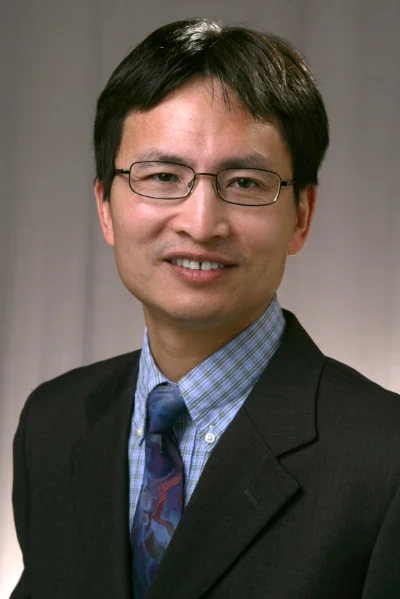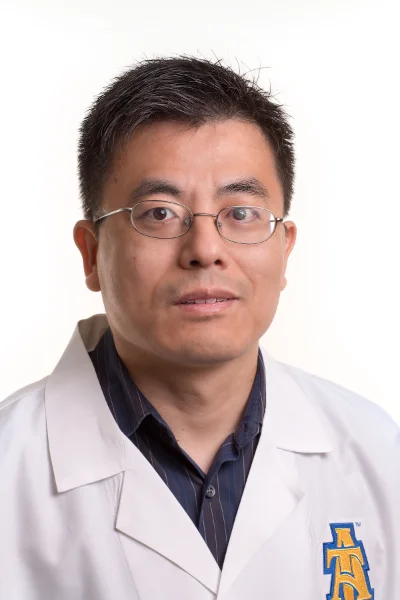CEPHT Faculty
 Leonard L. Williams, Ph.D.
Leonard L. Williams, Ph.D.Leonard L. Williams, Ph.D., currently serves as Director of the Center for Excellence in Post-Harvest Technologies (CEPHT), located at the North Carolina Research Campus in Kannapolis, NC. He joined N.C. A&T’s College of Agriculture and Environmental Sciences in 2008 as an Associate Professor in the Department of Family and Consumer Sciences and assumed the role of Director of CEPHT in 2010. Under his leadership, the center has expanded from 10 to more than 45 research faculty and staff. He also designed and oversees a CDC-certified Biosafety Level Three (BSL-3) laboratory—one of only four such facilities within the UNC System universities.
A recognized scholar and active member of multiple professional societies, Dr. Williams is widely respected for his research in food safety and the role of plant-derived nutrients in reducing food allergies, particularly peanut allergy. His recent publications highlight how polyphenols from peanut skins and berries may help reduce hypersensitivity to peanuts in specific populations.
Dr. Williams earned his undergraduate degree in Biological Sciences from N.C. A&T. He continued his studies at N.C. A&T, completing a Master’s degree in Animal Sciences, becoming one of the first graduates of the Animal Health Sciences program. He received his Ph.D. in Food Science and Technology, with a concentration in microbiology and immunochemistry, from Alabama Agricultural and Mechanical University.
 Rishipal Bansode, Ph.D.
Rishipal Bansode, Ph.D.Rishipal Bansode, Ph.D., is a Research Assistant Professor at the Center for Excellence in Post-Harvest Technologies. His research focuses on understanding how nutrients regulate lipid and glucose homeostasis. He employs integrated investigative strategies involving nutrigenomics, metabolomics, and proteomics to assess the health-promoting properties of nutrients in cell-based and animal models.
He has previously investigated the health-promoting and lipid-lowering effects of polyphenols present in peanut skin extract. Results from this study showed that peanut skin-derived polyphenols impart resistance to high-fat diet-induced hyperlipidemia in rats. These publications demonstrate that peanut skin polyphenols, especially proanthocyanidin A2, may possess hypolipidemic properties. This body of work highlights the significant therapeutic potential of using peanut skin as a value-added ingredient in peanut-based products, as well as in other foods, as a rich source of bioactive phenolic compounds.
Dr. Bansode also investigated the role of PKCβ in triglyceride homeostasis by studying the consequences of targeted disruption of this kinase, which led to the discovery of how the kinase promotes fat burning in adipocytes. His research confirmed that adipose PKCβ is specifically controlled by factors responding to dietary fat consumption, and that PKCβ expression is linked to the development of obesity.
Dr. Bansode received his doctoral degree in Food Science at Louisiana State University, Baton Rouge, in December 2005. In 2006, he joined the Department of Molecular and Cellular Biochemistry at Ohio State University, Columbus, as a post-doctoral researcher. He joined N.C. A&T in 2010.
 Guibing Chen, Ph.D.
Guibing Chen, Ph.D.Guibing Chen, Ph.D. is a professor of food process engineering at North Carolina A&T State University, where he has served since February 2010. Previously, he worked as a thermal processing engineer at ConAgra Foods. His research centers on functional food processing, microbial modeling, and ultrasonic pasteurization of liquid foods. Current projects include leveraging microfluidization to enhance the nutritional value of dietary fiber ingredients and the sensory qualities of fiber-enriched baked goods; developing mathematical algorithms and software for accurate parameter estimation in predictive microbiology; and designing a continuous ultrasonic reactor for rapid pasteurization of liquid foods. Dr. Chen earned a Ph.D. in Agricultural and Biological Engineering from Purdue University and M.S. and B.S. degrees in Chemical Engineering from Dalian University of Technology, China.
 Shengmin Sang, Ph.D.
Shengmin Sang, Ph.D.Shengmin Sang, Ph.D., is a Distinguished Professor of Functional Foods and Human Health at N.C. A&T / North Carolina Research Campus. He is also a full faculty member of the UNC Lineberger Comprehensive Cancer Center and the Center for Gastrointestinal Biology and Disease at UNC Chapel Hill, and serves as an Associate Editor of the Journal of Agricultural and Food Chemistry.
Dr. Sang’s laboratory studies food as medicine, with the overarching goal of using precision nutrition-based dietary regimens to combat and prevent chronic diseases. His research focuses on two main areas. First, his lab identifies bioactive components in functional foods and herbal medicines, such as ginger, tea, apple, blueberry, soy, whole grain wheat, oat, barley, and sorghum. They investigate these components’ bioavailability, biotransformation, and potential preventive effects on gut health and metabolic diseases using in vitro and in vivo models. His lab has identified carbonyl stress as a new target for dietary flavonoids in chronic disease prevention.
Second, his lab employs targeted and untargeted metabolomic approaches to study dietary and disease biomarkers. This includes utilizing flavonoids and novel metabolites as biomarkers for fruits, vegetables, and tea, as well as unique phytochemicals and their metabolites as biomarkers for whole grains.
 Janak R. Khatiwada, DVM, Ph.D.
Janak R. Khatiwada, DVM, Ph.D.Janak R. Khatiwada, DVM, PhD, is a Research Assistant Professor at the Center for Excellence in Post-Harvest Technologies, N.C. A&T State University. His research integrates food science, nutrigenomics, and microbiology, with a focus on the chemopreventive potential of phytochemicals and their applications in food safety and human health. He has over 15 years of research experience in molecular nutrition, proteomics, and nutrigenetics, with numerous publications on phytochemicals, bioactive compounds, and cancer prevention. Dr. Khatiwada serves as Co-PI on USDA- and USAID-funded projects addressing food safety, nutrition, and global food security.
He directs operations of N.C. A&T’s CDC-certified BSL-3 laboratory, advancing pathogen control and infectious disease research. His expertise spans extraction and characterization of plant-derived compounds, bioavailability studies, and in vitro/in vivo modeling of disease pathways. In addition to research, Dr. Khatiwada has taught graduate and undergraduate courses in food chemistry, preservation, and nutrition, and has mentored doctoral and master’s students. He contributes to the scientific community as an editorial board member, technical editor, and reviewer for leading journals in nutrition, microbiology, and biomedical sciences.



